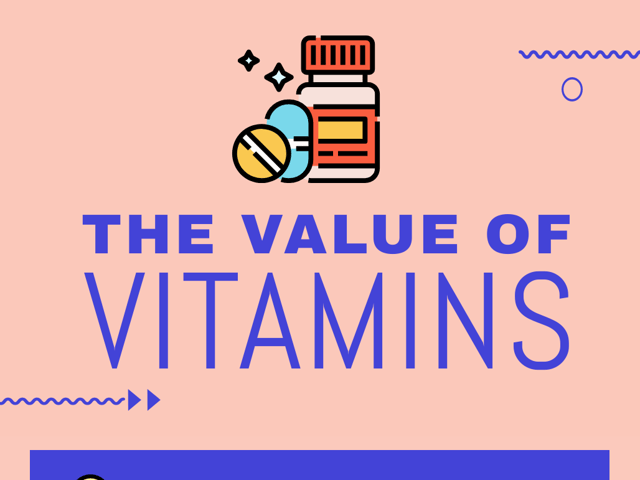
The Value of Vitamins
Certain vitamins and minerals are essential for our bodies to function properly and maintain an equilibrium (scientifically known as homeostasis).
How Vitamins Work
In simple terms, think of your body as an automobile. Without adequate levels of oil, gas, and coolant, your vehicle will not function at its best and could potentially even break down. Our bodies will do the same if we do not have an adequate amount of essential vitamins and minerals.
A Balancing Act
It is also important not to have too much of these vitamins as that can also lead to health problems. With a balanced diet and lifestyle, many people are able to obtain all the essential vitamins and minerals their body needs. However, others may need to supplement with a single multivitamin or a concoction of vitamins, depending on their specific needs.
Vitamin Purposes
Here is a brief chart of the essential vitamins your body needs to maintain homeostasis and their roles in doing so.
| Vitamin | Function |
|---|---|
| A |
|
| B |
|
| C |
|
| D |
|
| E |
|
| K |
|
Vitamin Quality
Your physician may suggest you start on a once-daily multivitamin if you are not getting all the vitamins you need from your diet. But, how do you know which one is right as there are so many from which to choose at your local pharmacy? When considering any vitamin or supplement product, it is important you choose one that has the “USP Verified” mark on its label. Over-the-counter vitamins and minerals are not regulated by the Food and Drug Administration (FDA). If a product has a USP verified mark on its label, this means that the United States Pharmacopeia confirms the product:
- contains the specified potency and amount of ingredients listed on the label
- does not contain harmful contaminants
- can be absorbed into the body after consumption
- and was produced following Good Manufacturing Practices set forth by the FDA.
In simple terms, a vitamin or supplement product may or may not contain the ingredients specified on the label unless it has been USP verified. Do your body a favor and be sure to choose high-quality vitamins.
Vitamin Contraindications
Remember, it is of utmost importance to consult your physician before you consider taking any over-the-counter vitamins or supplements. This is especially important if you are taking other medications or have underlying medical conditions. For example, someone who is taking the blood thinner warfarin, should not consider a product rich in vitamin K as this promotes blood clotting.
It is important to obtain the right balance of vitamins and minerals either through your diet or supplementation. But, it is also important not to take any vitamins in excess. Your physician should be able to help you determine if a vitamin supplement is right for you, while your pharmacist should be able to help you pick the best one.

Keep Reading

PTCB Pharmacy Technician Certification Exam Blog
Memorable Mnemonics: Master Drug Knowledge for the PTCB Exam
Studying for the Pharmacy Technician Certification Board (PTCB) exam is…

PTCB Pharmacy Technician Certification Exam Blog
The Top 200 Drugs on the PTCB
The Pharmacy Technician Certification Board (PTCB) exam is the final st…

PTCB Pharmacy Technician Certification Exam Blog
Is the PTCB Exam Hard?
Is the PTCB Exam Hard? Did you know that in 2021, over 430,000 pharmac…